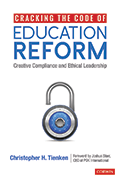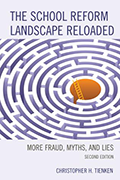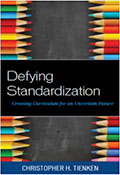Much of the school reform marketing revolves around the idea of treating parents and students like consumers: “Students and parents are our clients” is a rallying cry heard throughout the education-reform market. One underlying tenet of treating students and parents like clients is the idea of consumerism. The mantra of “choice” also rests upon a foundation of consumerism. But should we relegate students and parents to the passive position of consumer? Shouldn’t we want a larger role for them?
CHOICE WITHOUT VOICE
Consumption of education based on choice equates to quality in the market-based education reform world when viewing the choice through the consumerism and neoliberal lenses. Parents and students are sold the idea that the consumption of education via non-public, non-traditional, and corporatized delivery systems demonstrates modernization of the public school system. Former President G.W. Bush (1999) used charter schools as an example of how choice equates to quality:
“Charter schools encourage educational entrepreneurs to try innovative methods. They break up the monopoly of one-size-fits-all education. These diverse, creative schools are proof that parents from all walks of life are willing to challenge the status quo if it means a better education for their children. More competition and more choices for parents and students will raise the bar for everyone” (pp. 233–234).
Freire (2000) delineated between modernization via choice and societal development, stating that ‘‘The basic, elementary criterion is whether or not the society is a being for itself. If not, the other criteria indicate modernization rather than development’’ (p. 162). Choice does not automatically beget quality of life improvements. In the education sector, choice neither guarantees quality nor does it guarantee participation in decision making.
PARTNERS versus CONSUMERS
The act of choosing or consuming a commodity does not equate to involving oneself in the decision making about the design, development, leadership, or management of that commodity. In the consumerist marketplace education is a commodity and students and parents are reduced to purchasers or users, not decision makers or contributors to the quality of the product. For example, many non-public schools, including charter schools, usually do not have democratically elected boards of education. They commonly have appointed boards of directors. Parent and student involvement is relegated to superficial activities such as fund raising, signing student homework folders, or attending school events. There is no involvement in the decision making about programs, policies, or procedures because there is no democratic mechanism for involvement—there is only choice without authentic voice. Parents and students have the ‘‘choice’’ to comply with the policies or leave the school.
Public school educators can elevate students and parents out of the bowels of consumerism by treating them more like partners IN education and less like clients and consumers OF education.
Author’s note:
Adapted from Tienken, C.H. (2013). Neoliberalism, Social Darwinism, and Consumerism Masquerading as School Reform. Interchange (p. 304). http://christienken.comwp-content/uploads/2013/01/Neoliberalism_Tienken_2013.pdf
REFERENCES
Bush, G. W. (1999). A charge to keep. New York: William Morrow.
Freire, P. (2000). Pedagogy of the oppressed (30th ed.). New York: Continuum.


